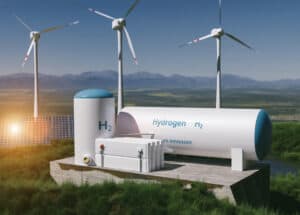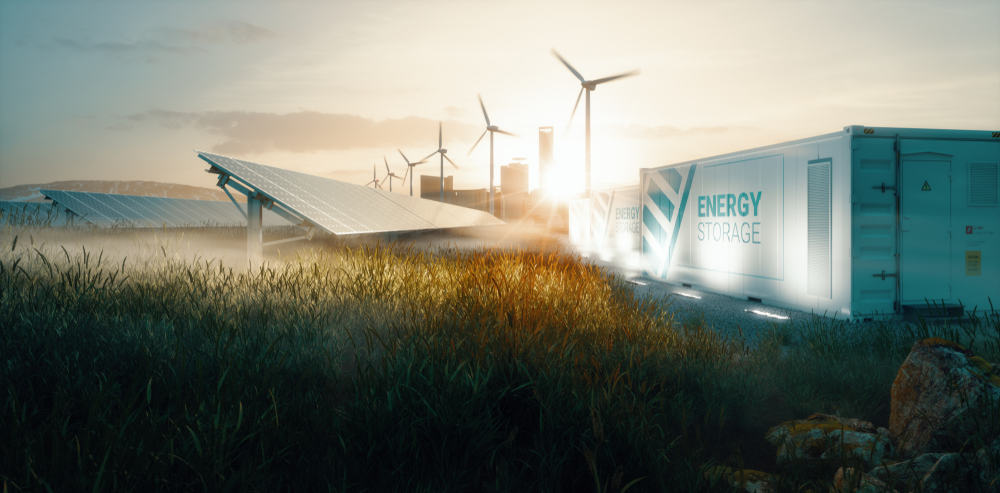How to Determine the ROI of a Hydrogen Renewable Energy System
If you're thinking of investing in a hydrogen renewable energy system, you may be wondering how to determine its ROI. Before diving into the specifics, let's take a quick look at its sources, applications, and cost. Friedmann says it's not useful to think of the green hydrogen projects cost as energy return on investment, but rather as a return on investment. He explains the reasons why. Read on to learn more.
Hydrogen Renewable Energy Overview
Hydrogen is a renewable energy source with a wide range of potential applications. Despite its relative inefficiency, it can be used to address critical energy challenges and decarbonize sectors. The oil industry and chemical industries, which use hydrogen as a feedstock, are already highly reliant on fuel. But by decarbonizing these industries, hydrogen can improve air quality and reinforce energy security. Globally, energy-related CO2 emissions reached an all-time high in 2018. Meanwhile, outdoor air pollution is one of the biggest health concerns, contributing to premature deaths.
The optimum green hydrogen technology pathway depends on trade-offs between several factors. These factors include initial capital investment, efficiency, and decarbonisation impact. Changing the energy system requires a substantial investment, and some options may be less costly initially but provide less carbon-savings than others. Hydrogen blends with CH4 will not result in optimal decarbonization, but they will be easier to implement and allow off-loading of surplus renewable power.
In the United States, approximately 7,600 hydrogen fuel-cell cars are on the road today. During the same period, there were 326,400 plug-in electric cars sold. Hydrogen is expected to play a significant role in decarbonizing certain vehicle segments. The benefits of hydrogen will most likely be felt in heavy-duty trucks and forklifts. The next step will be to increase the production of hydrogen fuel cells.
Hydrogen production is possible in three primary ways: thermochemical reforming of fuel, electrolysis, and photolysis. All of these processes produce hydrogen and have varying levels of efficiency. The most advanced method is SMR, which produces ninety percent of hydrogen globally, while electrolysis provides less than one percent. SMR is also the cheapest option, but requires CCS technology to deliver low-carbon green hydrogen production by country. While the cost of electrolysis is comparatively high, it offers a viable alternative to grid electricity.

How Does a Hydrogen Renewable Energy System Work?
The Hydrogen Renewable Energy System is a sophisticated process that harnesses the potential of hydrogen gas as a clean and sustainable energy source. This intricate system involves several essential steps to ensure efficient production, storage, conversion, and distribution of hydrogen energy.
Hydrogen Production
At the heart of the system lies the hydrogen production phase. There are various methods employed to obtain hydrogen gas, each offering unique advantages. One such method is electrolysis, which involves using electricity generated from renewable sources like solar or wind to split water molecules into hydrogen and oxygen. Additionally, other techniques like steam methane reforming and biomass gasification can also be utilized to produce hydrogen from different feedstocks.
Hydrogen Storage
Once produced, the generated hydrogen needs to be stored effectively to guarantee a steady and reliable energy supply. Specialized tanks or containers are used for this purpose, enabling the safe storage of hydrogen gas. The efficient storage of hydrogen is crucial, particularly during times when renewable energy sources may not be consistently available.
Fuel Cell Conversion
The stored hydrogen is then fed into a fuel cell, where an electrochemical process occurs. Within the fuel cell, hydrogen combines with oxygen extracted from the air to create electricity, water, and heat. This process, known as fuel cell conversion, is highly efficient and emission-free, making it an environmentally friendly energy conversion method. The electricity produced in this step can be utilized to power a wide range of applications, including residential and commercial buildings, transportation vehicles, and various industrial processes.
Energy Distribution
The electricity generated by the fuel cell can be utilized directly at the point of generation or integrated into the existing power grid for broader distribution. This integration enables surplus hydrogen energy to be shared and utilized in other locations, thereby increasing the system's overall efficiency and providing a scalable energy solution. This aspect of the process allows for the establishment of a comprehensive hydrogen energy infrastructure, contributing to the development of a cleaner and more sustainable energy landscape.

Where to Get a Hydrogen Renewable Energy System
Obtaining a Hydrogen Renewable Energy System requires careful consideration and research to ensure you choose a reliable and high-quality provider. Fortunately, with the growing demand for sustainable energy solutions, several avenues offer access to these advanced systems. Here are some sources with more detailed information:
Renewable Energy Equipment Manufacturers
Numerous well-established manufacturers that specialize in renewable energy solutions have expanded their product offerings to include hydrogen energy systems. These companies invest heavily in research and development, focusing on fuel cell technology and hydrogen production equipment. When seeking a hydrogen renewable energy system, it is beneficial to explore reputable manufacturers with a track record of delivering reliable and cutting-edge technologies.
Energy Infrastructure Providers
Companies involved in energy infrastructure and grid management often provide comprehensive energy solutions that incorporate hydrogen technology. These providers have a deep understanding of integrating various energy sources into existing infrastructure and can offer tailor-made solutions to meet specific energy demands. Collaborating with such firms can ensure a seamless integration of hydrogen energy into the broader energy landscape.
Government Initiatives and Programs
In some regions, governments actively promote the adoption of renewable energy systems, including hydrogen technologies, through incentives or funding programs. It is advisable to check with local or national energy agencies for information on available support and opportunities. Government initiatives can significantly reduce the financial burden associated with acquiring and implementing hydrogen renewable energy systems.
Research Institutions and Universities
Universities and research institutions play a pivotal role in advancing hydrogen energy research and development. They conduct cutting-edge studies, develop innovative technologies, and contribute to the overall growth of the hydrogen energy sector. These institutions may collaborate with companies to transfer knowledge and technology or provide consultancy services to help implement hydrogen energy systems effectively.
Energy Trade Shows and Exhibitions
Attending energy-related trade shows and exhibitions offers a valuable opportunity to stay updated on the latest advancements in hydrogen renewable energy systems. These events bring together industry experts, researchers, and manufacturers, providing insights into emerging trends and technologies. Networking at these events can connect you with potential suppliers and partners for your hydrogen energy project.

Hydrogen Renewable Energy Applications
With the growing demand for energy, the world's fossil fuel economy is becoming depleted. Because fossil fuels do not replenish themselves, they have no renewable properties. Additionally, most of the people who use them do not live in the region where they are extracted, so consuming nations have an incentive to control fuel supply regions. The use of hydrogen as an alternative source of energy is therefore the most promising way to help the world decarbonize.
Stationary fuel cells are becoming increasingly popular in data centers and hospitals as a backup power source for computers and servers. In fact, Microsoft has recently started testing backup generators powered by hydrogen. Hydrogen offers a wide range of options for mobile power generation. The earliest fuel cells were developed by NASA for spacecraft. These hydrogen-powered generators are highly efficient and can provide power for 13 hours or more. Hydrogen fuel cells also make good backup generators for trucks and other mobile devices.
Another use for hydrogen is in the chemical industry. Hydrogen can be used to make fertilizers, ammonia, and petroleum products. Hydrogen is being considered for use in the steel industry, which is already under immense pressure in Europe due to its pollution-causing effects. Hydrogen can help change the processes of steel-making, as well as save money on fossil fuels. But hydrogen is not a viable alternative for every industry.
Today, most hydrogen used in the world is produced through steam methane reforming. In this process, hydrogen is created by a catalyst reacted with methane. In addition to hydrogen, carbon monoxide and carbon dioxide are produced. Once this reaction is complete, the hydrogen remains pure, while carbon dioxide and hydrogen remain separated. Other fossil fuels, such as oil, can be used for hydrogen production. Although hydrogen is not a great energy source, it can be a useful commodity in transportation and power generation.
The Green Hydrogen Production Cost
Hydrogen is a highly sustainable form of energy. Its use has increased tremendously since the 1970s, and the demand has doubled since then. Today, global consumption is around 70 million tonnes per year. Furthermore, hydrogen is a clean energy source that produces no residue in the atmosphere. Furthermore, its production and use are cost-effective, and local governments often subsidize their costs. However, this energy source has limited capacity as a baseload operation.
To assess the cost-effectiveness of hydrogen production, consider several factors. The size of the installation determines its cost. There are different pathways for generating hydrogen, which can further reduce the cost. Currently, most hydrogen is produced in centralized plants, but there are also smaller-scale hydrogen production systems that can be used to supply the market. Costs associated with centralized production are typically higher than those of distributed production, as the hydrogen must be transported to different locations. However, many authors consider distributed production as the most likely pathway during the market development phase.
Hydrogen is a cleaner energy source than coal, and it can compete with traditional forms of fuel and energy. For instance, the Norwegian electrolyzer maker Nel ASA is targeting a cost of $1.50/kg by 2025. Meanwhile, Malaysian oil and gas giant Petroliam Nasional Bhd. aims to produce green hydrogen process at a cost of $1-$2 per kilogram by 2025. However, there are some challenges to overcome. To achieve this, investors need to invest across the value chain.
Despite high costs, some experts say that the cost curve is likely to bend in the coming years. The cost of hydrogen and electricity are highly correlated with the availability of a low-carbon electricity source. While there are many costs associated with producing green hydrogen revolution, the fuel cost will ultimately be the limiting factor. The P2X business case separates dedicated green electricity from excess green electricity. Hydrogen is the preferred energy for this application, but the cost of fuel will drive the profitability of the project.

Infrastructure
In a rapidly growing global energy industry, hydrogen is proving to be a highly viable and cost-effective source of renewable energy. A growing demand for the gas has led to a rapid growth of the production of hydrogen. Currently, over 6% of global natural gas and 2% of global coal are used for the production of hydrogen. This process is responsible for emitted CO2 of up to 830 million tonnes per year – the equivalent to the emissions produced by the United Kingdom and Indonesia combined.
The recent federal funding for hydrogen research and development in the recently passed infrastructure bill is raising questions about the future of this fuel and elevating its role in state carbon plans. In addition, advocates argue that hydrogen's potential role in reducing carbon emissions in heavy industry and long-haul transportation could be critical in achieving the goals set by the Paris Climate Agreement. In addition, the recent investment in U.S. hydrogen research shows that hydrogen is a promising fuel that is essential in a low-carbon future.
Currently, hydrogen is largely used in the petroleum refining and chemical processing industries. The key piece of infrastructure needed for hydrogen production is the electrolyzer, which is a process in which hydrogen is converted from a liquid into a gas. There are two basic types of electrolyzers: solid polymer electrolyzers and alkaline water electrolyzers. Solid oxide electrolyzers are currently being used in space and are expected to eventually replace PEM devices. In Iowa, renewable H2 is already competitive with conventional fuels.
State and regional efforts to build hydrogen hubs are underway to make hydrogen more accessible to consumers. The IIJA program will provide $8 billion for hydrogen hubs and has created a significant opportunity to leverage existing infrastructure and assets. The US Department of Energy's Office of Clean Energy Demonstrations is working to facilitate hydrogen hub development. Further, individual states are seeking hydrogen hubs to facilitate the economic development of hydrogen. However, state and regional governments will need tools to identify opportunities for hydrogen hubs and connect them with potential partners.
Conclusion
As I reflect on the information about hydrogen renewable energy systems, I am filled with a sense of hope and excitement for the future. The potential of hydrogen as a clean and sustainable energy source is undeniable, offering a promising solution to address critical energy challenges and combat climate change. Learning about its various applications, from powering heavy-duty trucks to providing backup power for data centers, reinforces the idea that hydrogen has the versatility to transform multiple sectors and make a positive impact on the environment.
While the cost of hydrogen production and infrastructure development may present initial challenges, the rapidly evolving technology and growing investments in the hydrogen sector indicate a promising cost curve that could bend favorably in the coming years. I am encouraged to see the dedication of governments, research institutions, and private companies in advancing hydrogen technology and pushing for its integration into the global energy landscape.
Hydrogen Renewable Energy System Sources
- Hydrogen energy systems – https://www.sciencedirect.com/science/article/pii/S1364032121004688
- The Future of Hydrogen – https://www.iea.org/reports/the-future-of-hydrogen
- Case study on the return on investment (ROI) – https://www.sciencedirect.com/science/article/abs/pii/S2210670715000281
- Investing Green – https://www.powermag.com/investing-green-driving-a-higher-roi-through-the-green-hydrogen-boom-and-wasted-energy/
- Green Hydrogen: A key investment for the energy transition – https://blogs.worldbank.org/ppps/green-hydrogen-key-investment-energy-transition
- Evolution of the conceptualization of hydrogen through knowledge maps, energy return on investment (EROI) and national policy strategies – https://link.springer.com/article/10.1007/s10098-022-02388-w
- Investing in hydrogen – https://www2.deloitte.com/content/dam/Deloitte/uk/Documents/energy-resources/deloitte-uk-energy-resources-investing-in-hydrogen.pdf

